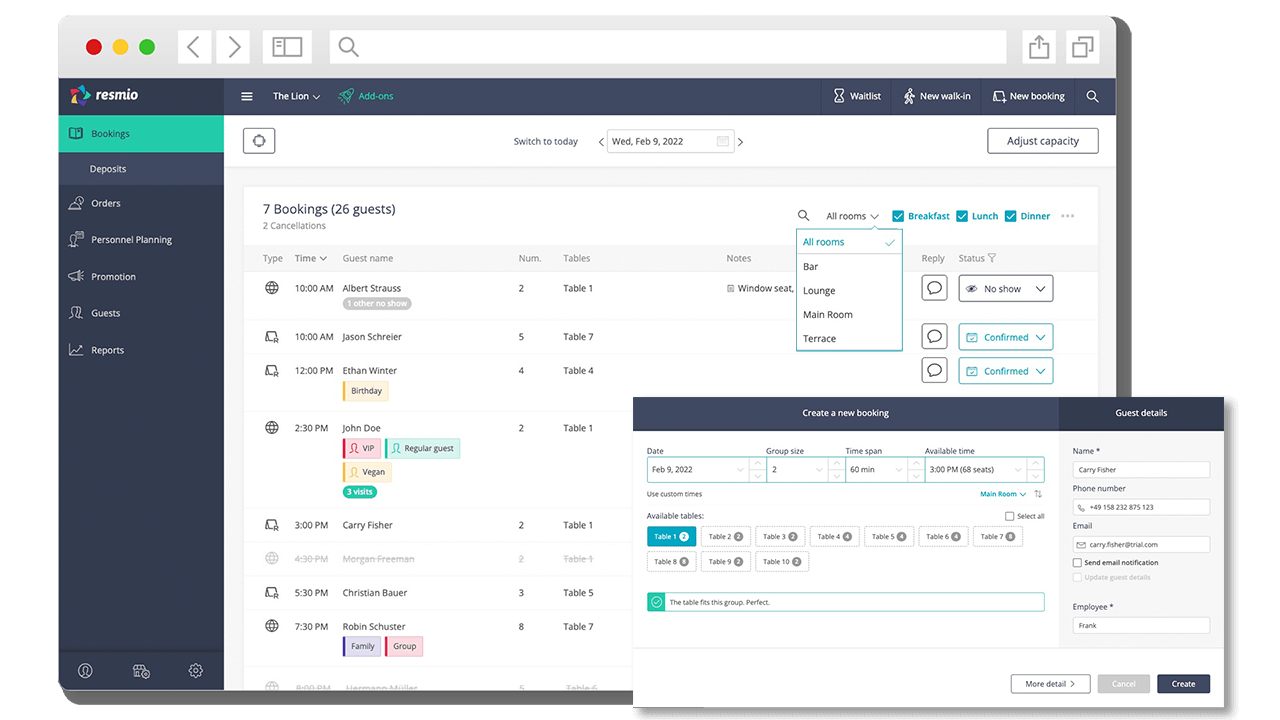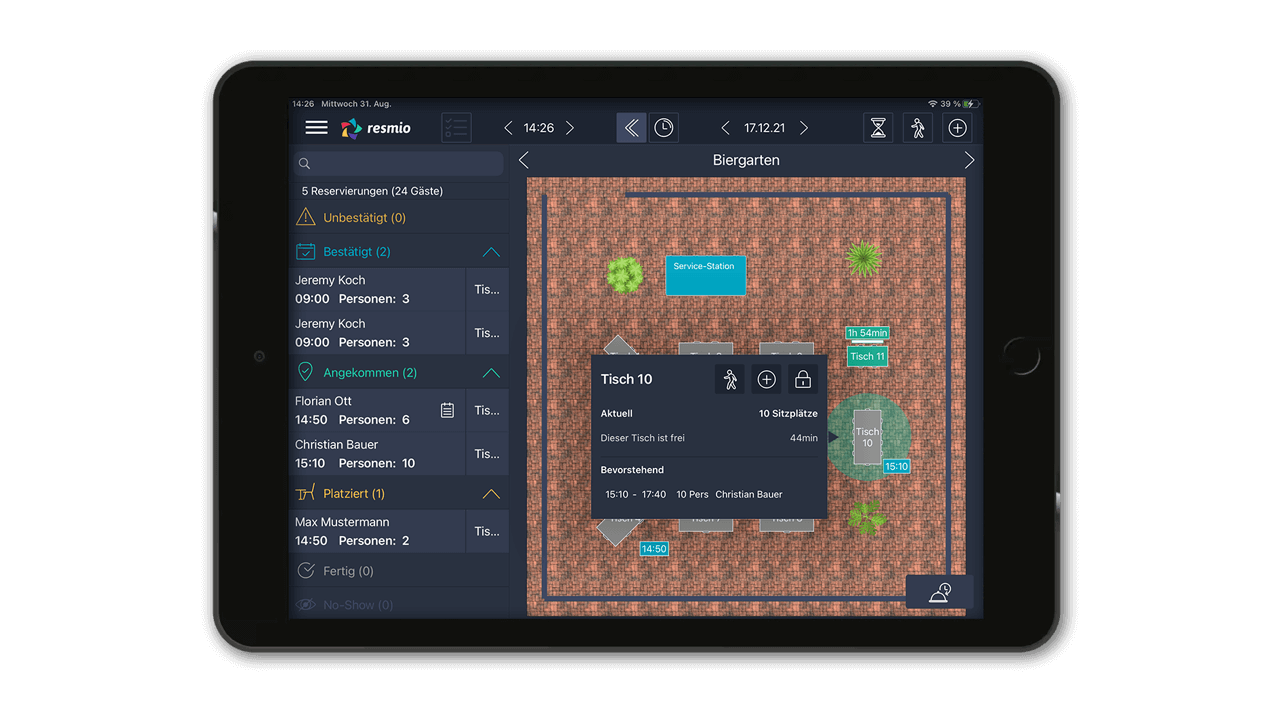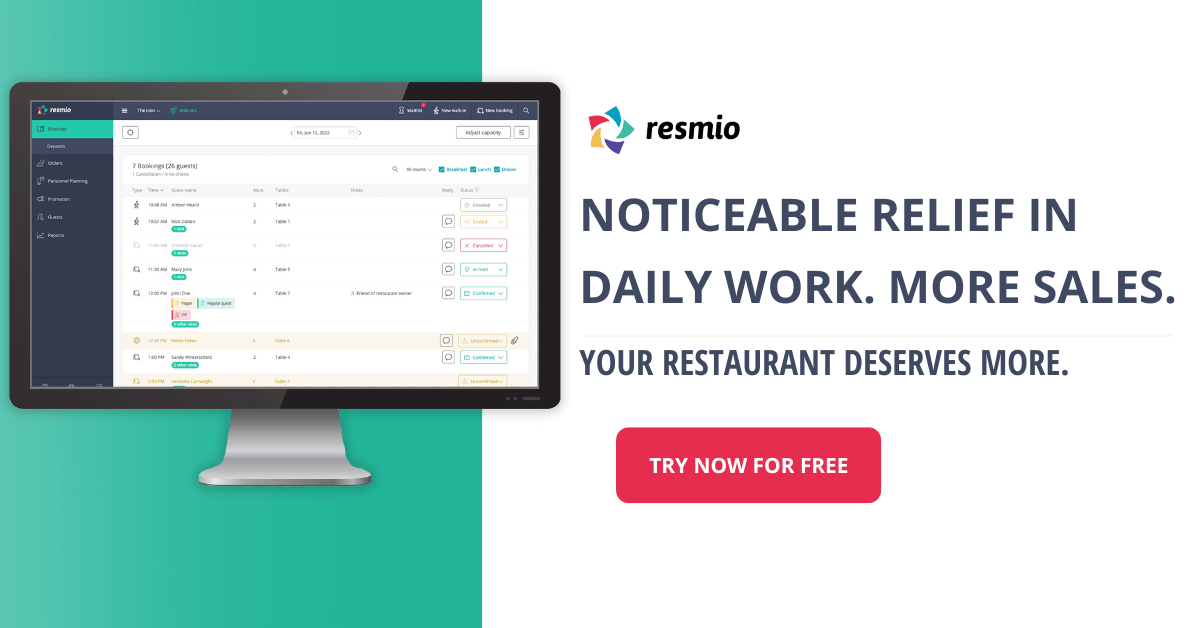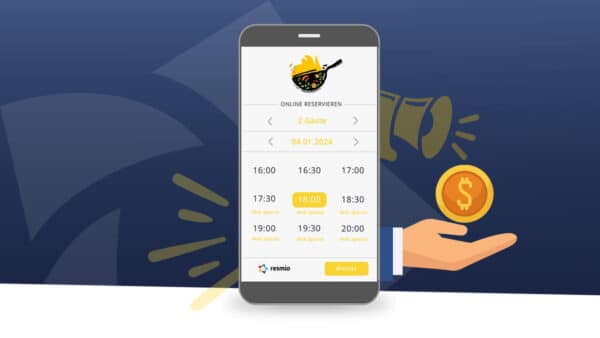From digital reservations to contactless payment: Digitalisation in the restaurant industry has been moving faster and faster, not least since COVID-19 pandemic. What are the benefits of digital transformation? This content piece provides a brief and compact summary of all relevant facts and figures.
Table of contents
- What is meant by Digitalisation?
- Digitalisation in the restaurant industry before and after COVID 19
- Digital transformation in the restaurant business – key figures
- Benefits of digitization in the restaurant industry
- Restaurants go digital – Which tools are available?
- Summary – The restaurant industry of the future
What is meant by Digitalisation?
There is no clear definition of the term Digitalisation. Depending on the business, there can be different interpretations. For the restaurant industry, the Gartner Glossary has summed it up best:
“Digitalisation is the use of digital technologies to change a business model and provide new revenue and value-producing opportunities; it is the process of moving to a digital business.”
Gartner Glossary
To put it simply, many processes in the business are no longer executed with pen and paper, but with bits and bytes.
Digitalisation in the restaurant industry before and after COVID 19
Digitalisation in the restaurant industry proceeded very slowly before COVID 19. In addition to a lack of expertise and budget, many restaurant managers often saw no need to digitize processes.
Sometimes, the impression was created that the business could survive without all the modern bells and whistles such as a website, online booking systems, social media channels and digital menus. Declining guest numbers and sales have been insidious at best.
With the onset of the COVID 19 pandemic in March 2020, the state of digitalization in the restaurant industry has evolved significantly. Distance and hygiene rules, nationwide lockdowns, the shortage of staff and, last but not least, shifting guest expectations have meant that restaurateurs have had to adapt their business models on the fly.
Incidentally, this will also be the case in the future, because the challenges will certainly not become any smaller as a result of inflation-related increases in food and energy costs.
Last but not least, the government is also providing an important boost. Funding pools worth millions and generous digital initiatives have given solo self-employed entrepreneurs and small restaurateurs in particular the financial resources they need to make the necessary investments.
Digital transformation in the restaurant business – key figures
Figures can also be used to demonstrate the boost to growth in digitization: Based on the German digitalization index for SMBs 2020 / 2021 (on behalf of Deutsche Telekom), the restaurant and catering industry was able to make substantial progress in comparison to previous years. However, the figures for individual restaurants are still below the industry average compared to providers in the hotel sector. The summary: In particular smallest businesses have to catch up digitally.
But even the average shows that there is room for improvement:
- 53% offer an online table reservation option for guests
- 46% work with a digital POS
- 33% operate a digital menu
- 23% store guest data digitally for contact tracing (but 36% in individual catering)
- 19% provide digital ordering of food and beverages
Given that the topic of COVID 19 continues to dominate the headlines at the start of 2022, a significant slowdown or trend reversal is rather unlikely. On the contrary, many restaurant operators who initiated the digital transformation learned to appreciate the benefits of digital measures. And those that have not taken any steps or have only taken tentative steps so far want to invest more in the above-mentioned areas in the future, regardless of the tense economic situation. Only time will tell whether this remains more than mere lip service.
Benefits of digitization in the restaurant industry
From HR and accounting to reservation and guest management as well as marketing, focused digital solutions can both optimize existing business processes and open up new business models.
The main benefits of digitization for the restaurant industry include the following:
- Cost and time savings through automation of in-house operational workflows
- Enhancing the company’s own level of competitiveness thanks to innovation and increased penetration
- More guests and sales through online marketing activities
- Increased customer satisfaction (e.g., through easy online seat reservations, digital payment options when ordering food and beverages, and customized offers
- Increased attractiveness as a hospitality business for sought-after professionals in times of staff shortages
Restaurants go digital – Which tools are available?
There’ s everything from taking table bookings to improving customer loyalty: In the restaurant and catering industry, today almost every process can be digitised. Below we show you the most important actions you can take to transform your restaurant business into a digital one:

Online Table Reservations
No matter whether you use booking platforms or online reservation systems, your guests can reserve a table at a specific time with just a few clicks. A standard paper reservation book and service staff who have to take incoming bookings by phone or email are largely obsolete.
Digital Food Ordering
Whether from home or with a digital menu in the restaurant: Nowadays, food orders can be digitised. That not only reduces the need for staff tremendously, but also helps the kitchen to prepare an order more quickly. Here, the restaurateur can impress guests with both service and speed! Those who set up their own, independent delivery service retain control over their guest data and save commission fees of up to 30 per cent compared to the way via relevant delivery platforms.
Digital Payment Methods
In countries like the USA, paying by smartphone has already become the standard in the hospitality industry. In Germany, however, the mobile payment trend has so far only made a big impact in the retail sector. Mobile payment offers numerous advantages, such as higher turnover and more tips.
Digital Check-in for Guests
The simple guest check-in and check-out via QR code has proven itself in most restaurants. Using pen and paper to acquire guest data is not only time-consuming, but also holds data protection risks. It is easier and more secure to follow up on contacts using digital check-in solutions.
Guests log in themselves via a QR code and log out again after the visit. Their guest data remains securely stored in your system and can be exported in file form by authorities upon request. An erasure schedule ensures that the contact data automatically vanishes from the system when the retention period expires.
Digital HR Planning
The starting point for digitalisation in HR planning are workflows and processes in the kitchen and service. Where and when are employees working and on what tasks? How can workflows be optimised and existing staff utilised in the best possible manner?
Your staff’s shift schedules can be managed more easily and efficiently with a digital shift plan. You have an overview of all shifts, work areas and absences of your employees. There is no need to print out staff schedules because you can easily share the rosters with the respective employees via WhatsApp, among other things. This saves time and money and increases employee satisfaction.

Service digitalisation
Achieving optimal capacity utilisation has been an important goal not only since the days of Corona’s distance regulations. Smart management systems support your service staff in day-to-day business: with the digital table plan, which can be operated either on a permanently installed terminal or as a mobile app for the iPad, your staff always have an overview of your capacity utilisation and can occupy the limited seats in the best possible way.
Digital Restaurant Marketing
Acquiring new customers and retaining customers are two important pillars for lasting success in the restaurant business. Restaurant operators can and should automate their marketing.
- A managed listing on Google My Business and an attractive restaurant website are the foundation for attracting new guests to your restaurant online.
- Feedback e-mails remind guests to leave a positive restaurant review after their visit. Recommendations from guests are in turn a crucial consideration for or against a visit.
- The knowledge of guest preferences such as special needs, tastes, wishes, but also possible allergies enables precise sales and marketing actions. With this in mind, it is recommended to build up a guest database.
- The next step is to activate regular guests who have already been convinced to return: personalised, tailor-made offers can be sent to groups of guests via email newsletters, for example.
- In addition, analysis tools and automatically sent weekly reports make it possible to regularly evaluate the restaurant’s own performance and thus continuously optimise the service.
- The next step is to activate regular guests who have already been persuaded to re-visit: for example, personalised deals can be sent to groups of guests via e-mail.
- In addition, analysis tools and automatically sent weekly reports make it possible to regularly evaluate the restaurant’s own performance and thus continuously optimise the service.

Summary – The restaurant industry of the future
The digital transformation of the restaurant and catering industry is moving forward at an ever faster pace. COVID19 ignited a real push for digitisation. Government actions such as the granting of financial aid and loans for related projects have helped the hospitality industry to initiate urgent digital projects.
More and more restaurants are using online reservation systems, digital menus and streamlined administrative tasks. However, small and medium-sized restaurants are still lagging behind, according to a recent study.
Various opportunities for digitalisation can optimise the company’s processes. This can save costs and attract new guests. According to the latest figures, those who open up to digitalisation will increase their ability to be competitive. Resmio provides you with numerous solutions to improve your restaurant business. If you are interested, we would be happy to advise in person, with no obligation and on an ongoing basis – get in touch with us today!




